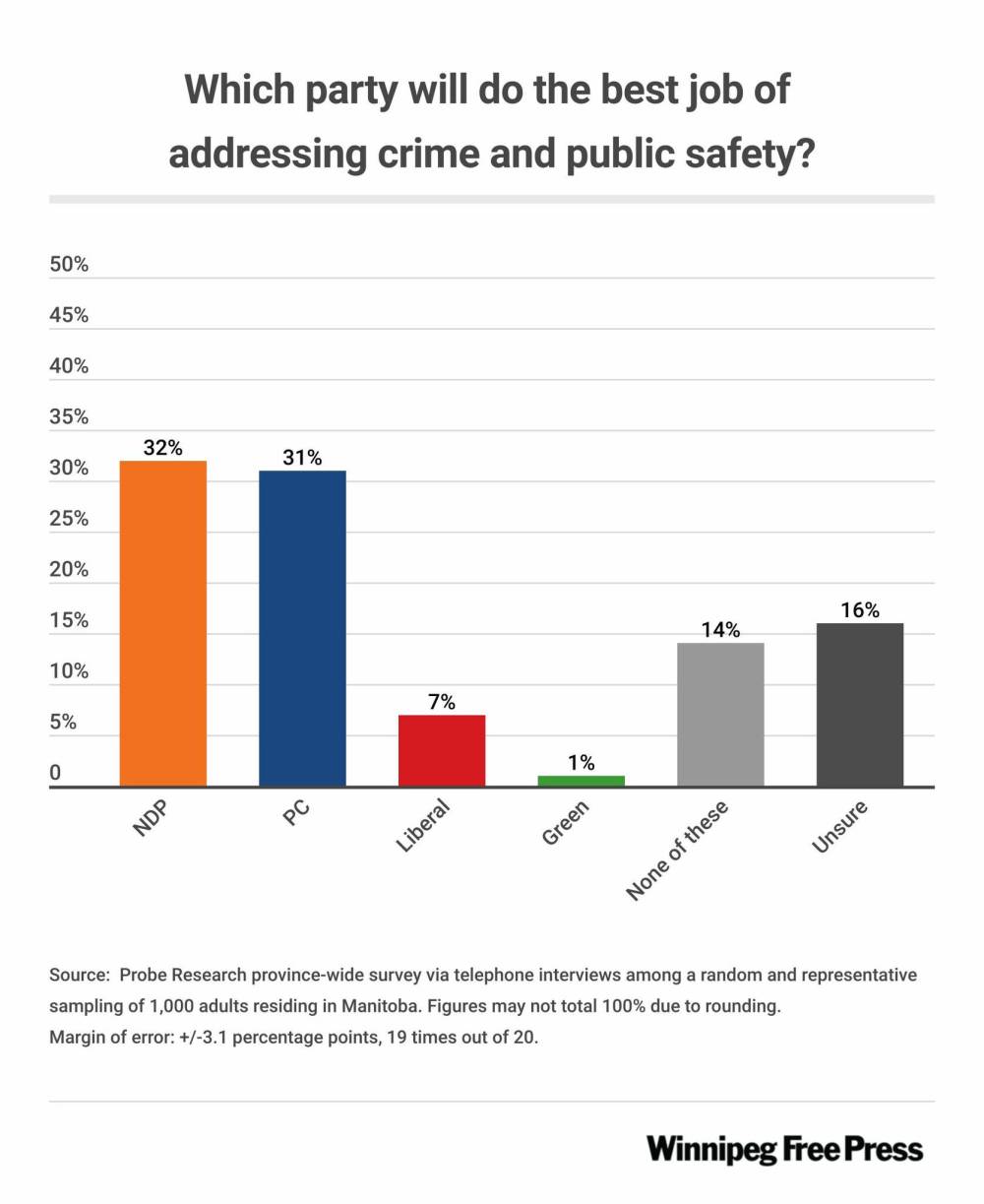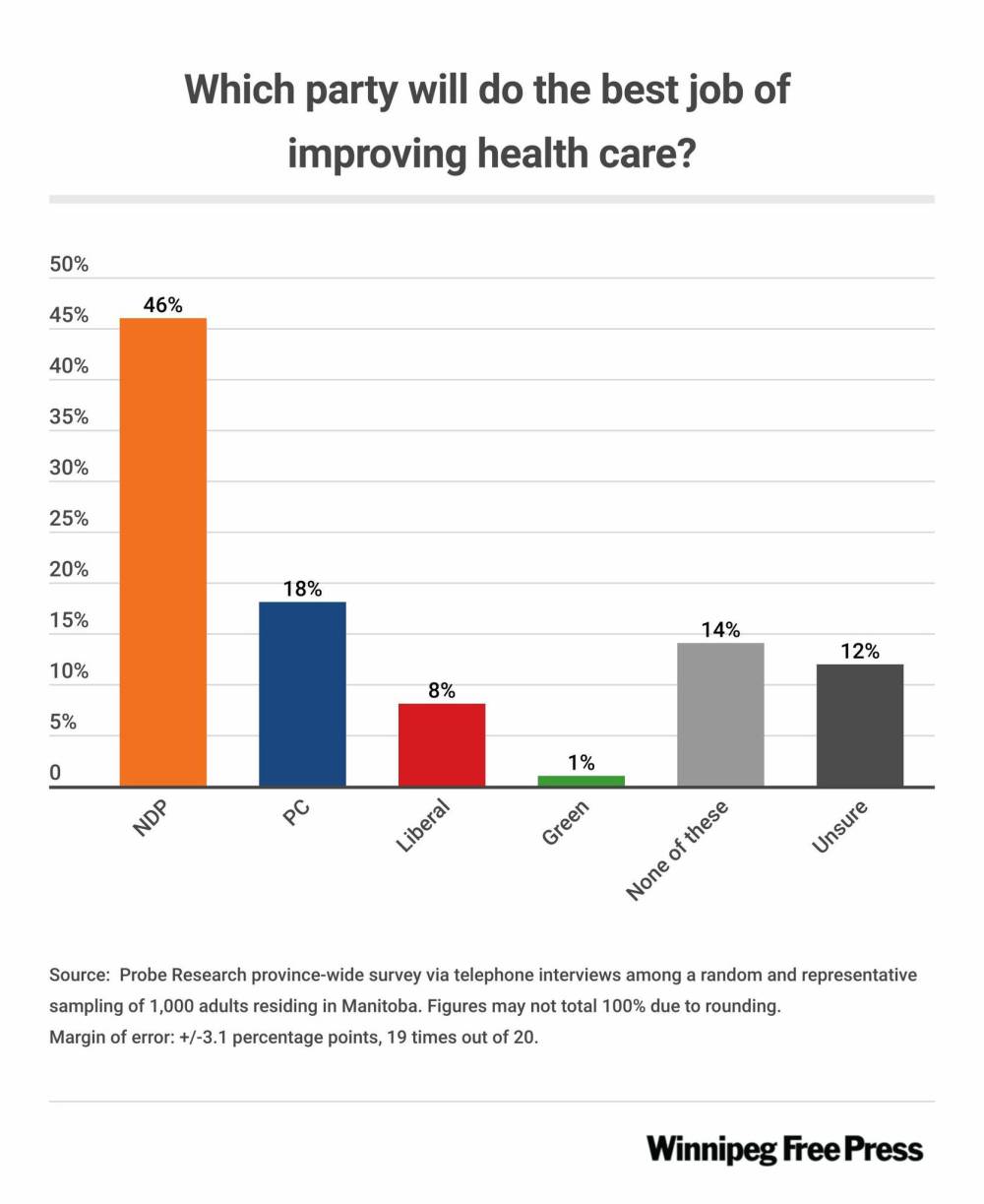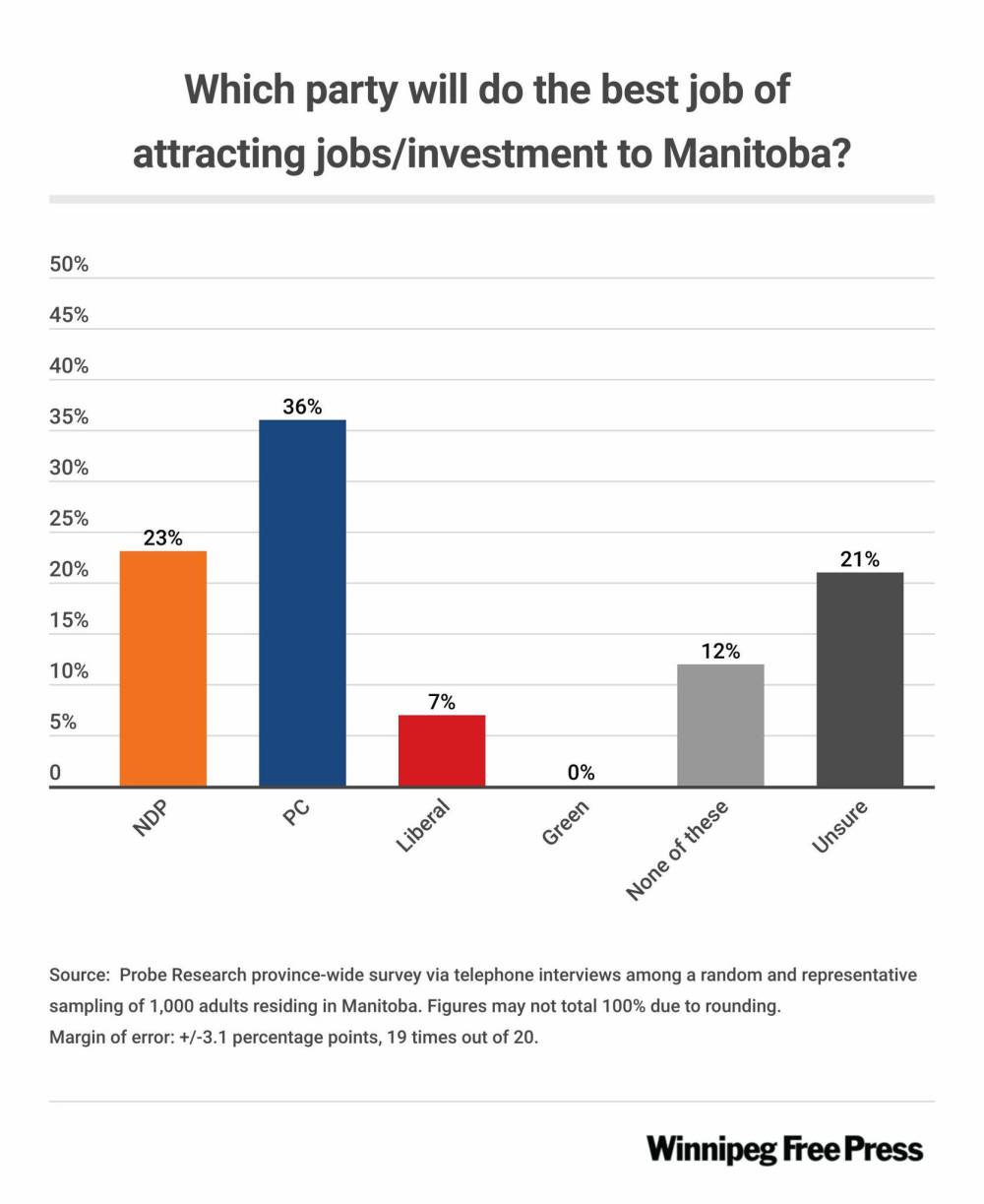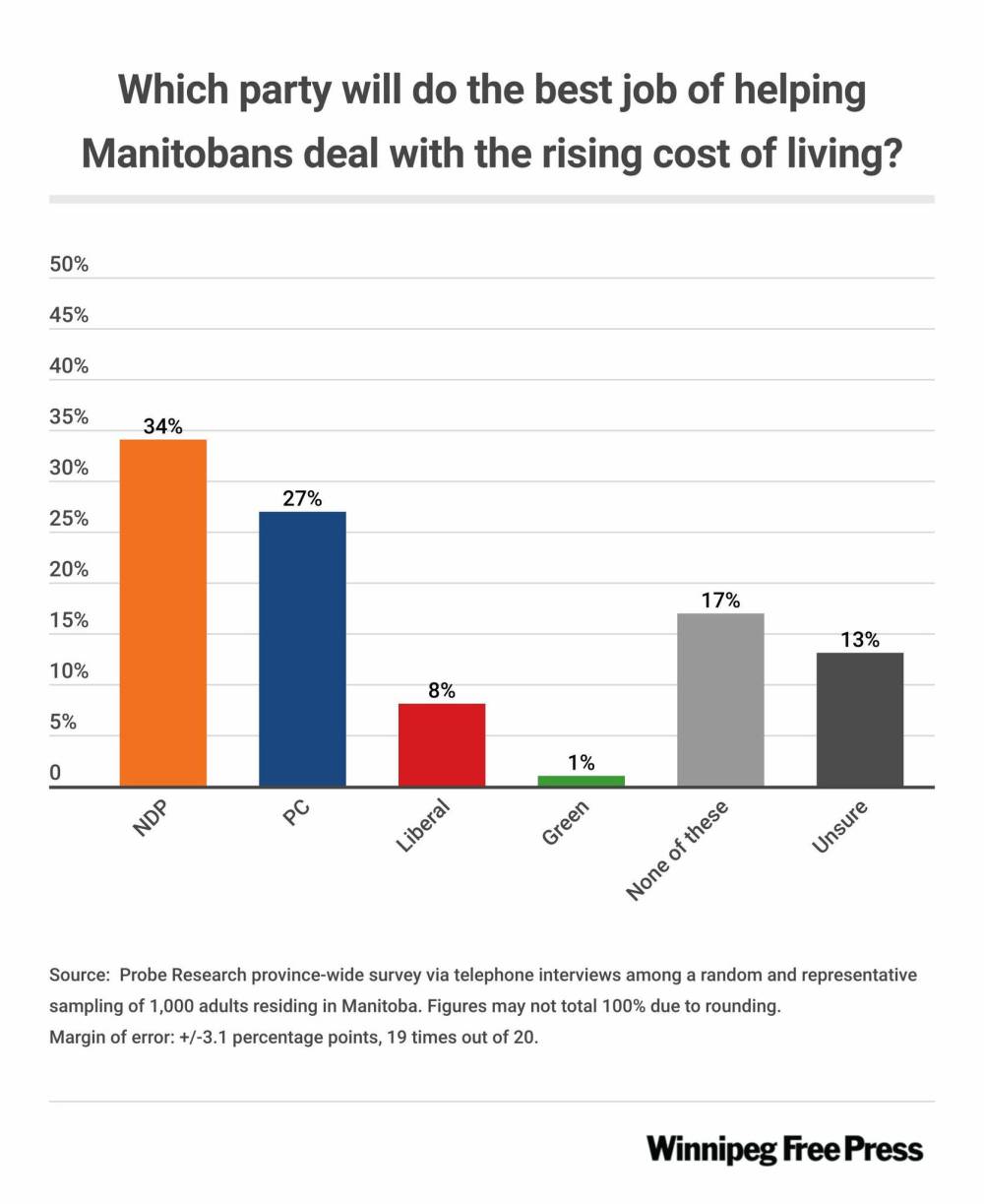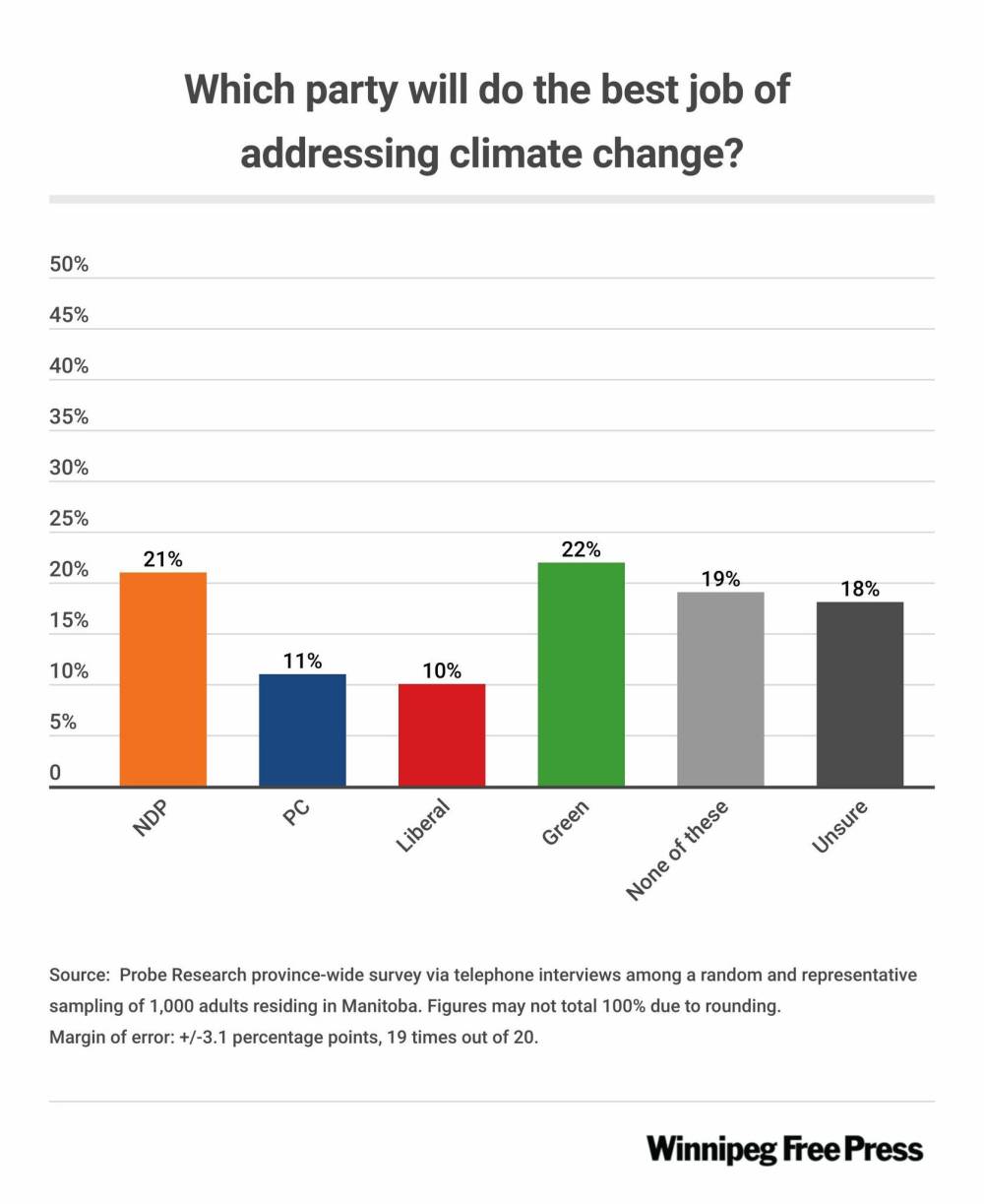NDP edges past Tories on public safety plank: poll
Manitoba voters name crime, health care, poverty/homelessness top election issues
Advertisement
Read this article for free:
or
Already have an account? Log in here »
To continue reading, please subscribe:
Monthly Digital Subscription
$0 for the first 4 weeks*
- Enjoy unlimited reading on winnipegfreepress.com
- Read the E-Edition, our digital replica newspaper
- Access News Break, our award-winning app
- Play interactive puzzles
*No charge for 4 weeks then price increases to the regular rate of $19.00 plus GST every four weeks. Offer available to new and qualified returning subscribers only. Cancel any time.
Monthly Digital Subscription
$4.75/week*
- Enjoy unlimited reading on winnipegfreepress.com
- Read the E-Edition, our digital replica newspaper
- Access News Break, our award-winning app
- Play interactive puzzles
*Billed as $19 plus GST every four weeks. Cancel any time.
To continue reading, please subscribe:
Add Free Press access to your Brandon Sun subscription for only an additional
$1 for the first 4 weeks*
*Your next subscription payment will increase by $1.00 and you will be charged $16.99 plus GST for four weeks. After four weeks, your payment will increase to $23.99 plus GST every four weeks.
Read unlimited articles for free today:
or
Already have an account? Log in here »
Hey there, time traveller!
This article was published 22/09/2023 (813 days ago), so information in it may no longer be current.
Premier Heather Stefanson and her Progressive Conservatives have staked their political lives on tackling crime and boosting public safety. It turns out Manitoba voters think Wab Kinew and the NDP could do just as good of a job.
According to a Free Press-CTV poll, conducted by Probe Research, 31 per cent of respondents say the Tories would be best at addressing crime and public safety, while 32 per cent believe the NDP would be up for the task.
The poll asked Manitoba voters what they see as the biggest issues in the 2023 provincial election. The top three: crime and violence in their communities (25 per cent); state of the health-care system (23 per cent); and poverty/homelessness (23 per cent).
Other issues raised by at least one in 10 Manitobans, less than two weeks before they cast ballots in the Oct. 3 election, were rising cost of living (14 per cent), drugs and addiction issues (12 per cent) and housing (11 per cent).
Tied with two other issues in 10th place — at only four per cent — is the Tories’ other big platform plank: taxation.
“When you look at the two main issues, crime and health care, in the eyes of voters the Tories and the NDP are at a draw with each other for crime, but with health the NDP are stronger,” Kelly Saunders, associate political science professor at Brandon University, said Friday.
“That could explain the spread between the two parties now… It’s also safe consumption sites and issues around harm reduction… It’s not just a matter of hiring more police officers. The NDP are seen to be stronger on these issues,” she said.
“The Conservatives have lost the bet on this one. It looks like the social policy issues are more dominant this time around. The issues are lining up for the NDP.”
“The Conservatives have lost the bet on this one. It looks like the social policy issues are more dominant this time around. The issues are lining up for the NDP.”–Kelly Saunders
Data from the poll, published earlier this week, show the NDP appear to have opened a commanding lead, with the support of 57 per cent of Winnipeggers and 49 per cent of Manitobans.
The Tories have the support of 28 per cent of Winnipeggers and 38 per cent of Manitobans. The Liberal party has only nine per cent support across the province and 11 per cent in Winnipeg.
Mitch Bourbonniere, a Winnipeg community outreach worker and anti-gang activist, agrees crime is the top issue in this election — and hopes whichever party is elected will tackle the root causes.
“People want their leaders to address violent crime, drug addiction, homelessness, and gang activity,” he said. “The poll shows the public hope either party address this. I’m really hopeful (post-election), we will work on it.”
Rick Linden, sociology and criminology professor at the University of Manitoba, said he can understand why crime is top of mind with Manitobans.
Winnipeg’s violent crime severity level in 2022 was the highest it’s been since 2009, according to police data. The capital city logged a record 53 homicides last year.
“It looks like people are looking at the past seven years, and are saying (to the Tories) you had your chance and you didn’t do it,” Linden said of the poll results on which party would be best to address crime.
“Normally, the Conservatives have historically had better polling on the crime issues. So anything that shows a difference now is ‘you had your chance.’”
“Normally, the Conservatives have historically had better polling on the crime issues. So anything that shows a difference now is ‘you had your chance.’”–Rick Linden
Darlene Jackson, president of the Manitoba Nurses Union, said she is pleased but not surprised to see health care among the voters’ top issues.
“Anyone who has had to access the health-care system, you know it is not great out there,” Jackson said. “And we know poverty and homelessness are absolutely intertwined with health care.”
Kate Kehler, Social Planning Council of Winnipeg executive director, said taxation being at the bottom of the list while poverty/homelessness is near the top is no mystery.
“Most people I know say they are happy to pay taxes if they see progress,” Kehler said. “We certainly know poverty is a high concern.
“I would strongly encourage people to look at the various campaigns and what they are saying about it. There’s a lot of talk about affordability, but that’s more for middle-class people.”
Curtis Brown, a principal with Probe Research, said the poll highlights another issue which should concern the Tories: why a large number of people who voted for them in 2019 say they are supporting the NDP this time.
The poll found 52 per cent of that group say they will vote now for the NDP because they believe that party would be best to improve health care.
When that same group was asked which party would be best to help people with addictions and mental health issues, 51 per cent selected the NDP. Forty-one per cent of them also said the NDP was better-suited to help Manitobans deal with the rising cost of living, and 37 per cent said the NDP would improve the education system.
Brown said the poll also found splits between the concerns of Winnipeg voters versus their rural/northern peers. While 31 per cent of Winnipeggers are concerned about crime and violence, only 17 per cent outside Winnipeg see it as an issue, he added.
Urban and rural voters are tied with concerns about health care, at 23 per cent. Only seven per cent of rural residents see poverty/homelessness as an issue, compared to 34 per cent in the city.
Brown said the issues which matter more to rural/northern residents than those in Winnipeg are cost of living, with support from 17 per cent of rural and northern residents and 12 per cent in Winnipeg, infrastructure with 10 per cent of rural and northern versus eight per cent from Winnipeg, and jobs/economy at 10 per cent rural and northern and six per cent in the city.
The poll of 1,000 Manitobans was conducted Sept. 7-18. The margin of error is plus or minus 3.1 percentage points, 95 per cent of the time.
kevin.rollason@freepress.mb.ca

Kevin Rollason is a general assignment reporter at the Free Press. He graduated from Western University with a Masters of Journalism in 1985 and worked at the Winnipeg Sun until 1988, when he joined the Free Press. He has served as the Free Press’s city hall and law courts reporter and has won several awards, including a National Newspaper Award. Read more about Kevin.
Every piece of reporting Kevin produces is reviewed by an editing team before it is posted online or published in print — part of the Free Press‘s tradition, since 1872, of producing reliable independent journalism. Read more about Free Press’s history and mandate, and learn how our newsroom operates.
Our newsroom depends on a growing audience of readers to power our journalism. If you are not a paid reader, please consider becoming a subscriber.
Our newsroom depends on its audience of readers to power our journalism. Thank you for your support.



